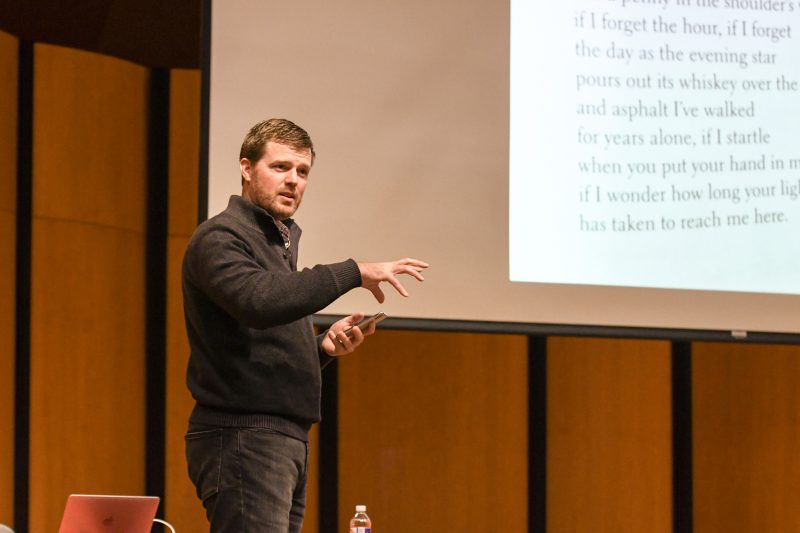“I’m not really sure there are music notes, or where they exist in time and space,” said Forrest Pierce during his hour-long presentation at the Celebration of Living Composers held in Ruth Taylor Recital Hall on the afternoon of Saturday, Jan. 13. “But here we are.”
As a fan of music without much technical knowledge, this sums up my experience listening to three composers discuss their approaches to writing music. That afternoon, Dan Forrest, Forrest Pierce and Carter Pann each gave individual talks in which they played selections from their bodies of work and explained their approaches to arranging each composition. That night, they showcased their work in a combined concert featuring all three composers.
Much of Pierce’s talk concerned the challenge of finding purpose in his career, while all three discussed their individual inspirations. Pierce’s talk was structured around divinity and existentialism, which was apparent in his “philosophical and eloquent compositions,” to borrow from Dan Forrest’s characterization of Pierce’s work.
On Saturday night, four of Pierce’s pieces structured around Rumi’s poetry were performed by pianist Carolyn True and vocalist Jacquelyn Matava, both members of the music department faculty. The piece highlights how Pierce’s instrumentals accompany vocals, with Matava’s voice sounding almost like the skeleton that True’s piano then fleshed out.
Next, the Trinity Chamber Singers performed “Short is Time,” based on a poem whose haunting words were serviced by the choral arrangement. I was impressed by the way in which Pierce produced similar emotions with arrangements designed for very different vocals and from poetry from very different time periods.
Each composer took a different approach to their talks. Carter Pann started off the afternoon with a casual presentation of his varied works. As Pann played each composition, he allowed the audience to read along with the sheet music. This came in handy as Pann himself discussed that his compositions may be too clever; he says that the complexity of the pieces can obscure the music.
This cleverness is apparent in pieces like “Capital Punishment,” performed by a saxophone quartet, which Pann confessed that he thought was too fast an arrangement. While I agreed with Pann’s assessment of the speed and complexity work, there was a consistent line of joviality in the cleverness of his arrangements that justified the complicated structures.
Carolyn True, who had taught a teenaged Pann to play the piano years ago, performed two of Pann’s arrangements: “An Irish Tune,” and “Soirée Macabre.”
“An Irish Tune” displayed Pann’s affinity for ragtime, while “Soirée Macabre” evoked a vampiric sound. Both were infected with the same fast-paced energy that seems to define Pann’s work.
Dan Forrest introduced an extremely helpful concept for anyone hoping to pursue artistic professions, even outside of composition. He discussed a three-pronged Venn diagram where one one circle represented personal voice, another circle indicated financial need or commissions, and the final circle stood for outside interest or audience.
The diagram proved to be helpful in envisioning how composers living today make their work, having to balance the financial needs and outside interest with artistic contributions. Forrest discussed often having to find a balance between his voice and his commissions, or his voice and external audiences, but never between financial and marketing without his voice.
The Chamber Singers performed two of Forrest’s pieces, “Good Night, Dear Heart” and “Abide.” Forrest played piano for the latter piece. Like Pierce’s work, both of Forrest’s compositions are arranged around poetry. While there are traces of the divine in both poems, Forrest’s pieces seemed to focus much more on the beautiful and humane aspects of life, which fitted his earlier discussion of life as a composer.
Hearing the composers discuss their personal experiences and how they affect their work gave more meaning to listening to their pieces and added a universality to their very specific music discussion. While only about 20 people attended the afternoon talks, an audience of around 100 came out to see the evening concert.
By that point, there was an accumulated sense of the benefit of celebrating living composers. You still weren’t sure, like Pierce, if music notes actually exist in time and space, but you could feel the presence of the composers’ individual philosophies in each of their performances.







